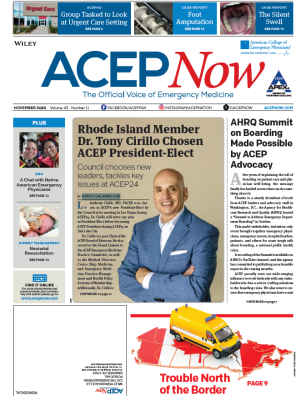My friend and colleague Jay Ryno and I went speed dating recently. We had a great time and met many young people with whom we would be glad to partner.
Explore This Issue
ACEP News: Vol 29 – No 04 – April 2010You’re probably thinking that we’re a bit old for this. Well, at least Jay.
There was no cologne, karaoke, drinks with umbrellas, or uncomfortable silence involved. We didn’t even have to give out our phone numbers or e-mail addresses.
This was specialty speed dating with first- and second-year medical students at the University of Toledo College of Medicine. This event was a collaboration between our local Academy of Medicine and the medical school. Physicians from all over the community came to share their impressions and experiences in their chosen specialty. Twenty specialties were represented, and nearly 80 students participated.
Twenty tables were arranged in a long, narrow U-shape, and the students came in sets of four, spending only 7 minutes per table. Just enough for a taste. This was a great way for these neophytes to get a feel for what options they have ahead of them.
As I think back about how clueless I was at that stage, I wish there had been a program like that for me. Back then, emergency medicine likely would have been placed at the equivalent of the children’s table at Thanksgiving. On this night, we sat proudly between the anesthesiologists and the psychiatrists. One could induce sleep with drugs, the other by just talking to you. We stayed awake just fine.
We fielded many questions regarding work hours, lifestyle, typical workday, etc. One of the most common and most important questions was, “What do you like best about your specialty?”
We’ve all had days when we could answer that question with a resounding, “Nothing!” For me, those days have been few. I found it easy to rattle off the things I like.
One of the biggest changes in our specialty is the extent to which we will evaluate patients. We have become the diagnosticians of the hospital, at least for acute illness, and I like that. The direct admit is nearly extinct. Generalists and specialists alike know that if a patient is sent through emergency, we are likely to find the diagnosis (or significantly narrow the differential) and initiate appropriate treatment.
In the past, if someone presented at 2 a.m. with RUQ pain and fever, they would get admitted, and the surgeon would order an ultrasound in the morning.
Now, we can confirm the diagnosis of cholecystitis and tell the surgeon, while the antibiotic runs, the width of the common bile duct.
In the past, a 45-year-old who suffered chest pain climbing steps would be admitted to rule out MI and get a stress test the next day.
Now, we can quickly rule out myocardial damage and also order a chest CT to rule out pulmonary embolism, aortic dissection, and coronary artery disease.
These are just two of the many examples of how our specialty has adapted to and embraced the changes that have occurred in other specialties. Any advance in the acute care of patients in a given specialty becomes our advance and our challenge as well. This is exciting stuff, and it explains why we remain the most nimble specialty of all.
The other thing I like is that we are the last true generalists. Name one other specialty where in 1 week you could place a chest tube, deliver a baby, convert atrial fibrillation, do an LP on an infant, remove a corneal rust ring, close a complex laceration, reduce a dislocated shoulder, diagnose and treat sepsis, recognize scabies, treat acetaminophen poisoning, remove a bug from an ear, council a patient about sexually transmitted disease, nasally intubate someone in respiratory failure, diagnose Bell’s palsy, and coordinate nursing home placement for an elderly man with dementia.
Most other physicians won’t admit it, but they really do rely on us in the ED, and we make an enormous impact on the care of the patients that we share. I also believe that many are secretly envious of all the skills we have. They may not enjoy the chaos of our workplace, but they would love to have our skill set.
I think students gravitate to EM because we practice the way that country doctors used to practice. In that day, you were required to do everything for the patient. Luckily, most of us are not as completely alone as many old-time country doctors were; but the can-do mentality still lives in EM. A wide knowledge base, years of experience, and a large portion of humility served those doctors well.
Us too.
Dr. Baehren lives in Ottawa Hills, Ohio. He practices emergency medicine and is an assistant professor at the University of Toledo (Ohio) Medical Center. Your feedback is welcome at David.Baehren@utoledo.edu.
Pages: 1 2 3 | Multi-Page




No Responses to “Mind If I Dance With Your Date?”